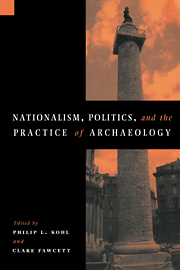1 - Archaeology in the service of the state: theoretical considerations
Published online by Cambridge University Press: 06 October 2009
Summary
This book developed out of a symposium examining the relationship between nationalism and archaeological practice which was organized for the American Anthropological Association meetings, Chicago, November 1991. Several of the articles published here (Wailes and Zoll, Arnold and Hassmann, Anthony, Kaiser, Kohl and Tsetskhladze, von Falkenhausen, and Fawcett) represent expanded versions of the papers presented in that symposium; the others (Diaz-Andreu, Lillios, Shnirelman, Tong, Chernykh, and Nelson) were later solicited by the editors for this publication, as were the general commentaries by B.G. Trigger and N.A. Silberman. Initially, we planned to obtain an essentially “global” coverage of issues relating to nationalism, politics, and the practice of archaeology, and more than two dozen archaeologists were contacted in hopes of obtaining such coverage. The articles that appear here deal exclusively with European and East Asian archaeology, an unintended focus representing the contributions of those scholars who responded affirmatively to our invitation.
It is unfortunate, of course, that certain areas are not covered. We particularly regret lack of coverage on the nationalist practices of archaeology in Israel, Turkey, and other Middle Eastern countries; in North and sub-Saharan Africa; in South Asia; in Mexico; and in Peru and neighboring countries (e.g., conflicting interpretations of Tiahuanaco), but it is also obvious that the issues associated with the relationship between archaeology and nationalist politics, whether considered historically or in terms of contemporary developments, are ubiquitous.
- Type
- Chapter
- Information
- Publisher: Cambridge University PressPrint publication year: 1996
- 11
- Cited by

